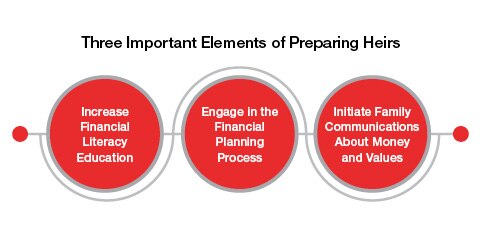Considerations for the Great Wealth Transfer – Part Three

The Key Wealth Institute is a team of highly experienced professionals representing various disciplines within wealth management who are dedicated to delivering timely insights and practical advice. From strategies designed to better manage your wealth, to guidance to help you better understand the world impacting your wealth, Key Wealth Institute provides proactive insights needed to navigate your financial journey.

The three important elements of preparing heirs are:
- Increase financial literacy education
- Engage in the financial planning process
- Initiate family communications about money and values
In Part 1, we shared resources to help provide your family with financial education to increase their financial literacy. We also shared ways you can engage yourself and encourage family to engage in the financial planning process. The sense of financial well-being provided by education and planning may help reduce a perceived need for an inheritance.
In Part 2, we explored conversation starters that help enhance family communication and lay a foundation for a discussion about financial wealth and inheritance. Having meaningful conversations more often about what really matters may help reframe the structure for a dialogue about inheritance.
In Part 3, we explore approaches to the wealth transfer conversation. In 2019 Key Private Bank surveyed its advisors and "over 75% of advisors polled by Key Private Bank said that the hardest part of estate planning is navigating interfamily dynamics."4
Family Dynamics
Open, respectful communication contributes to improved family dynamics, and it also helps prepare your heirs for their inheritance. The best time to clear up misunderstanding is now, rather than leaving them to try work it out after you are gone at great relational and financial cost. If the issues are too difficult to resolve on your own, then consider hiring a mediator or coach to help you and your family. Explore resources at organizations that provide conflict management coaching, which is a specialized process designed to help individuals enhance the ways they manage and engage in conflict. Consider reading about or even taking a course in Compassionate Communication, also known as Nonviolent Communication, pioneered by Marshall Rosenberg in the 1960s. The Center for Nonviolent Communication provides a list of trainers who provide personal and organizational support for transforming the way we speak to ourselves and others.
| Nonviolent Communication | ||
| Empathy | Honesty | |
| Observations | Did you notice … | I hear / I see … |
| Feelings | Are you feeling … | I feel … |
| Needs | Are you needing … | I would like … |
| Requests | Would you like … | Would you be willing to … |
What Is Your Vision for Your Family?
In Part 1 of this series, we asked you to imagine the day your children or grandchildren receive the wealth you are leaving them. How do you hope they respond? What do you hope they say? What do you hope they do? What impact do you hope the financial wealth you give them will make on their lives? You will find these questions and more in our Checklist of Legacy and Estate Planning Topics for Your Family.
Not sure what legacy and estate planning topics are relevant to you?
Here’s a checklist to start.
Know the difference between an estate and legacy plan, and discuss them both.
- An estate plan addresses assets, such as property, family heirlooms, and money.
- A legacy plan addresses non-financial capital, such as family history, traditions, values, and philanthropic goals.
Begin by considering your vision for your family’s future.
- What would you like to pass down to your children and grandchildren?
- What are your family’s short-term, medium-term, and long-term goals?
- Are your finances set up to meet your family’s goals?
- Are your children facing unique circumstances, such as multiple marriages or disabilities, that would impact the family’s future?
- Are your heirs prepared to be good stewards of their inheritance?
Work with your advisor to create and collect the documents needed to maintain and manage your estate over the long term.
- Will
- Certificates
- Trusts
- Deeds
- Bank account and retirement plan information
- Debt and tax information
Discuss long-term care and diminished capacity, and determine who has decision-making power in the event of a medical emergency for all adult family members.
- Financial power of attorney
- Health-care power of attorney
- Living will
- Long-term care insurance
If you’re a business owner, think about a succession plan and how your family will play a role.
- Who will take over the business, and how will it be operated?
- What are the ownership splits with your partner(s)?
- What is the exit strategy?
Don’t forget to take inventory of your digital assets and how they factor into your estate, and keep a secure, up-to-date record of all passwords.
- Email and social media accounts
- Websites
- Online memberships and credit card purchases
- Online banking accounts
- Digital intellectual property, such as writings or photography
Create a schedule to update your estate and legacy plan with your advisor on a recurring basis to factor in any changes to your wishes.
What Do Your Documents Say Will Happen?
Ideally, your legal documents affirm and help implement what you have discussed and explained to your children and grandchildren. For many people, a durable power of attorney, health care directive, will, and perhaps a revocable trust are all the documents they need to provide for themselves in the event of their incapacity and for their heirs after their death. Some situations are so straightforward that simple online services for document preparation will be sufficient.
However, most people will need the more custom estate planning services provided by a law firm that specializes in advising clients with the level of financial wealth and types of assets owned. To make the most of your time with your attorney, explore the estate planning options with your KeyBank advisor first. Schedule a meeting with your KeyBank advisor to review your financial plan, projections for the growth of your estate, and estate planning strategies that address the priorities you have for yourself and for your family. Where it makes sense, we offer clients an estate plan review and flow chart to help illustrate how much you may end up leaving your heirs and the potential impact of probate expenses, estate taxes and other considerations.
Bottom Line
One of the most impactful ways to prepare your heirs is to improve family communication, especially the ability to actively listen to understand the other person. Improved communication skills may also help reinforce your family’s interest in increasing their financial literacy and engaging in the financial planning process. Continuing to take all three of these steps over and over will help make your great wealth transfer truly great by having your family thrive not only financially but in life.
For more information, please contact your advisor.

About Renee Porter-Medley
Renee is a highly experienced professional who works closely with the relationship team to understand a client’s personal situation and goals and develop an integrated, customized set of strategies to help them reach their objectives. She earned a Bachelor of Arts in International Studies with a major in Finance from the University of Michigan, and a Master of Professional Studies in Organization Development from Penn State University. Renee an active member of Kingdom Advisors, the Planned Giving Council, and the Purposeful Planning Institute. Her professional development for the past 10 years has been focused on helping families flourish by leveraging financial capital to develop their human, social, intellectual, and spiritual capital.